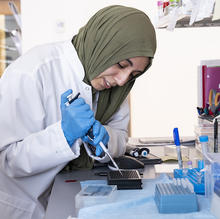- October 24, 2023
Certain types of mushrooms—or fungi—may have a place in infrastructure, potentially saving costly repairs and time. Xijin “Emma” Zhang, assistant professor in civil engineering, is researching this relatively new area of engineering and other green technology solutions for common challenges.
- October 23, 2023
With funding from the Virginia Department of Transportation (VDOT), CEIE professor Shanjiang Zhu and his research team will reconcile travel data from three different sources—surveys, smartphones, and connected vehicles—into invaluable travel information.
- October 18, 2023
Collaboration between colleges has led to the creation of a unique autonomous surface water vehicle, collecting samples and reducing manual labor for researchers.
- October 16, 2023
New research into identity verification from George Mason University may put your security directly in the palm of your (sweaty) hand.
- October 11, 2023
Can wearable tech resolve the crisis of underemployment among neurodiverse individuals? A multidisciplinary Mason research team is about to embark on a major study to find out.
- August 23, 2023
The National Science Foundation's Navigating the New Arctic researchers traveled to a remote location to attend the Permafrost and Infrastructure Symposium in Utqiaġvik, Alaska, some 320 miles north of the Arctic Circle.
- May 30, 2023
Celso Ferreira in George Mason University's College of Engineering and Computing is studying the impact of climate change on jobs in the Chesapeake Bay region.
- April 4, 2023
The project, “A study on the ultrahigh salt adsorption capacity of an energy-efficiency water desalination technology,” was supported by a 4-VA@Mason Collaborative Research Grant with the goal of designing next-generation electrode materials to advance the energy-efficient CDI technology.
- March 30, 2023
Mason graduate student Rebecca Leung is part of a team finding ways to use smart technology in order to help those who are struggling with or recovering from substance use disorder (SUD).
- March 30, 2023
George Mason University researchers are taking advantage of DNA molecules’ self-assembly properties to develop vaccines rapidly, publishing their findings in Communications Biology










